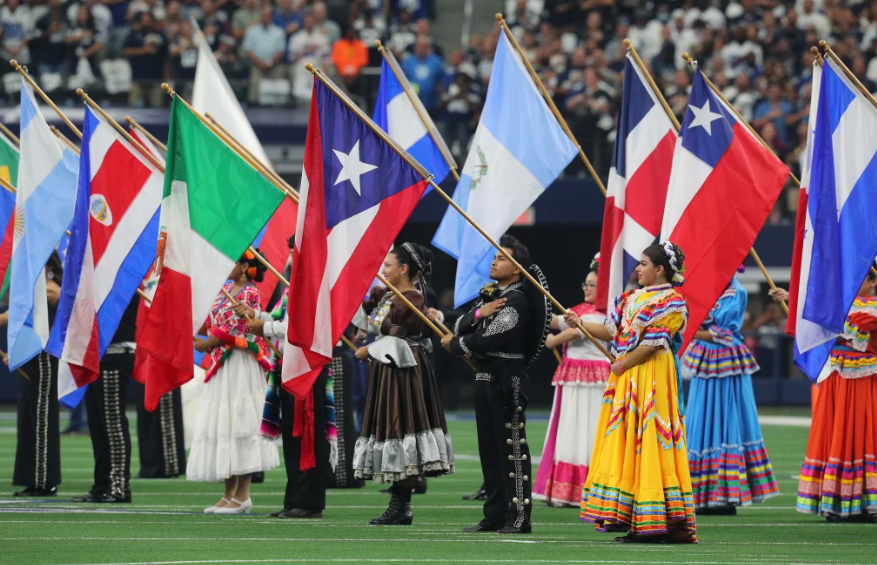Many Hispanic teens in the US say they feel a deep connection to their heritage, even if they never learned to speak Spanish. However, the subject of language fluency can sometimes be a sensitive topic in these communities. While 78% of US Hispanics believe it isn’t necessary to speak the language to still identify as Hispanic, 54% of non-Spanish-speaking Latinos report experiencing shaming from others for their lack of fluency (PBS NewsHour). More times than not, this criticism comes from family members, peers, or social media posts, where the term “No Sabo Kid” has started to gain popularity. For context, a “No Sabo Kid” is someone who struggles with Spanish, oftentimes despite their Hispanic heritage.
Despite having to face these challenges, Hispanics are redefining what it means to be a part of their culture and community. Social media platforms like TikTok and Instagram have allowed safe spaces for these people to share their experiences and struggles with their heritage and Hispanic identity (El País). Content creators like Riana Metzger and Isabella Andreoni often use their platforms to express that there is more to being Hispanic than just knowing the language. They speak of the other values like music, traditions, and family values that are also part of what it means to be Hispanic.
Additionally, many Hispanics are beginning to want to improve their Spanish skills as a way to feel more connected with their heritage. Janel Rodríguez, a writer for PopSugar, shares her story about how despite struggling with Spanish early on in life she later improved her Spanish skills and felt a reconnection with her Puerto Rican roots. For many Hispanics, learning Spanish is not just about meeting expectations, but about strengthening their identity and connection to their Heritage.
Interestingly enough, another shift beginning to take place in Hispanic social media communities is a change in the meaning of the term “No Sabo Kid.” Originally used as an insult, many young Hispanics are now embracing the term with cultural pride. Instead of feeling shamed and insulted by the term, young Hispanics are now using it to connect with others who share similar experiences. This change shows progress towards more inclusive Hispanic communities around the US, where cultural identity can be positively shared.
Ultimately, there is so much more to being a Hispanic than language, now more than ever. Young Hispanics around the US are proving that being Hispanic is about embracing your heritage, values, and traditions, whether you speak Spanish or not.
Spanish Translation
Muchos adolescentes en los Estados Unidos dicen que ellos sentían una conexión profunda con el patrimonio, aunque ellos nunca aprendían a hablar español. Sin embargo, el campo de fluidez de lengua a veces puede ser una tema sensible en estas comunidades. Aunque 78% de los EE.UU. Hispanos creen que no necesitan hablar la lengua a todavía identificar como hispano, 54% de latinos que no hablan español reportan experimentar deshonra por su falta de fluidez (PBS NewsHour). Más veces que no, las críticas son desde miembros de familia, amigos, o publicaciones de redes sociales, donde el término “No Sabo Kid” ha aumentado en popularidad. Por contexto, un “No Sabo Kid” es una persona que tenía problemas con el español. A menudo a pesar de ellos patrimonio Hispano.
Aunque ellos tengan que enfrentar desafíos, Hispanos están cambiando lo que significa ser hispano. Las Plataformas de redes sociales como Tiktok e Instagram han creado espacios seguros para estas personas para compartir sus experiencias y dificultades con su patrimonio e identidad hispano (El País). Creadores de contenido como Riana Metzger y Isabella Andreoni usar sus plataformas para expresar que ser hispano es más que conocer el idioma. Hablan sobre los otros valores como música, tradiciones, y valores de familia que también son parte del ser hispano.
Adicionalmente, muchos Hispanos están empezando a querer mejorar su habilidades de hablar español como una manera de sentir más de una conexión con su patrimonio. Janel Rodriguez, una escritora de PopSugar, comparte la historia sobre cómo a pesar de el problema con hablar español temprano en la vida, más tarde, Janel mejoró sus habilidades en español y sentía una reconexión con ella raíces puertorriqueñas. Para muchos Hispanos, aprender español no es solamente sobre alcanzar expectativas, sino sobre fortalecer sus identidades y la conexión a su patrimonio.
Fascinantemente, hay una otra cosa: empezar a tener lugar en comunidades Hispanos de redes sociales, un cambio en el significado del término “No Sabo Kid.” Originalmente usado como un insulto, muchos jóvenes Hispanos están abrazando el término con orgullo cultural. En vez de sentirse avergonzado e insultado por el término, jóvenes Hispanos están usando el término para conectar con otros que comparten experiencias similares. Este cambio muestra el progreso a comunidades hispanos más inclusivas alrededor de EE.UU, donde la identidad cultural puede ser compartida positivamente.
En última instancia, hay mucho más en el idioma hispano que idioma, ahora más que nunca. Hispanos jóvenes alrededor de los Estados Unidos están demostrando que ser hispano es sobre abrazando su patrimonio, valores, y tradiciones, si hablas Español o no.
